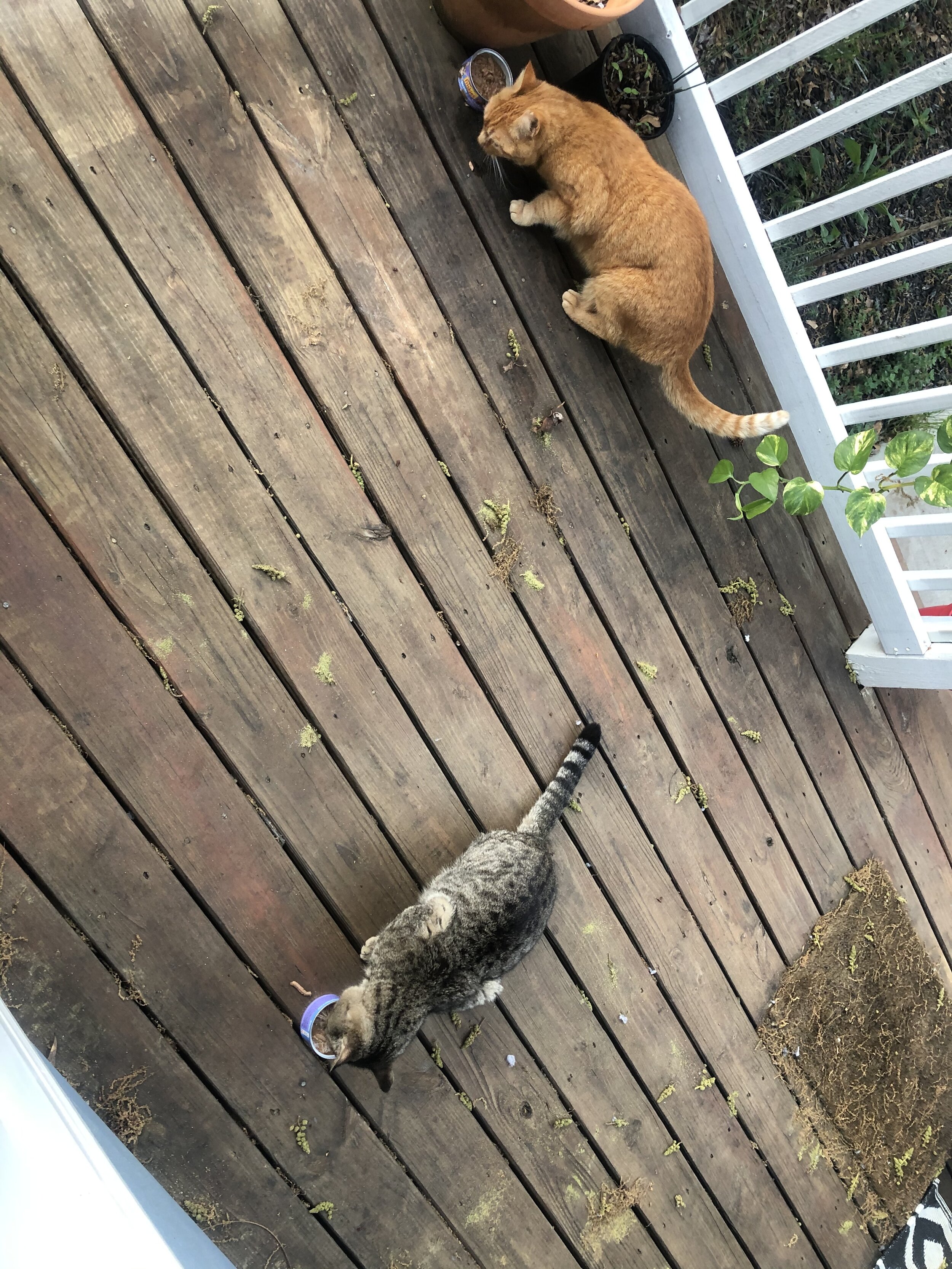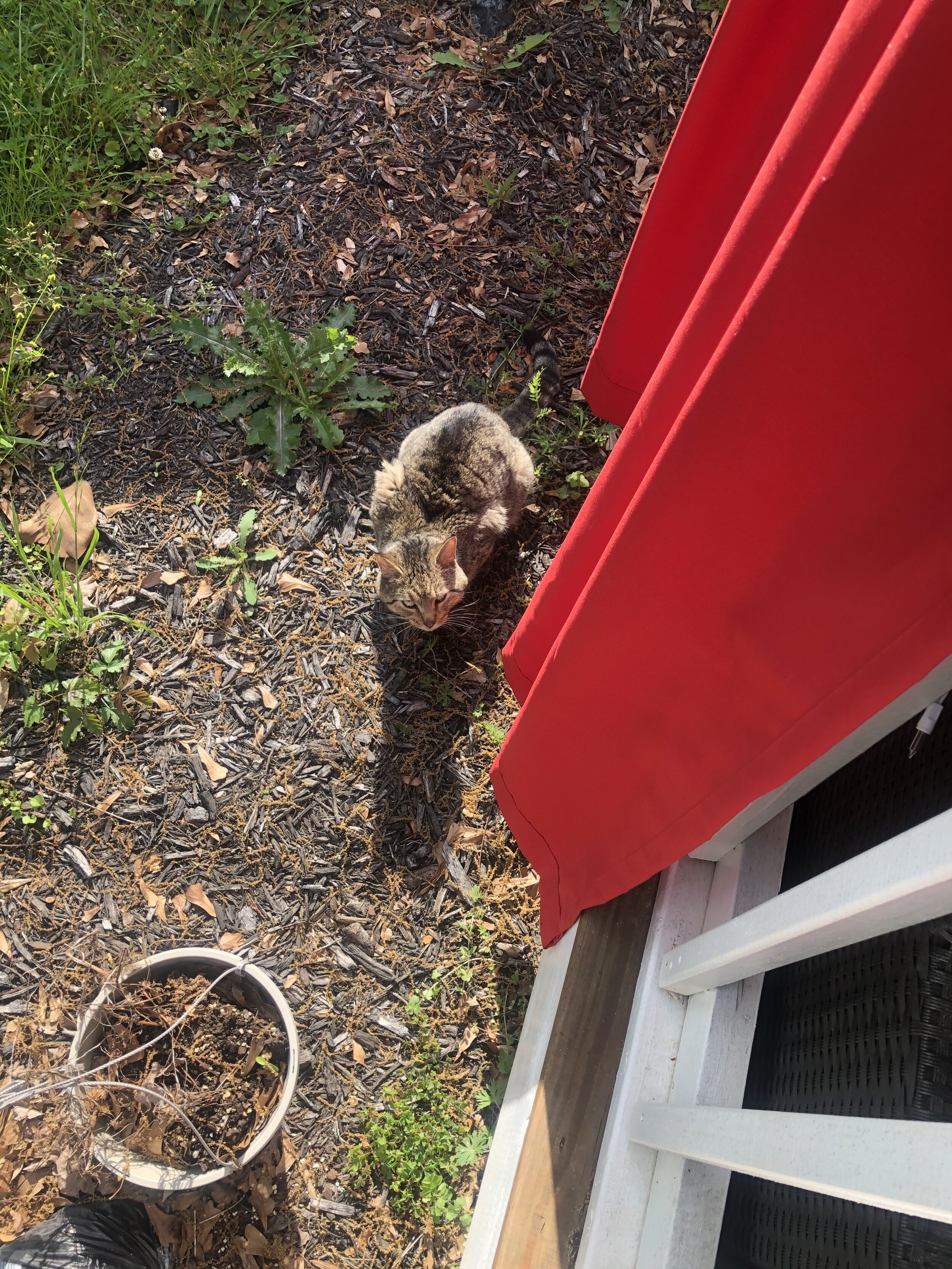How to be more resilient
If you aren’t intentionally placing yourself in uncomfortable, unfamiliar or undefined spaces in your real life, you probably aren’t developing the skills needed to deal with the uncomfortable, unfamiliar or undefined in your work life.
How do you build resilience?
The question came up in today’s leadership meeting. We were discussing overall team morale. The general feeling of anxiety at another pending org change was acknowledged by all, but so was the inevitable nature and frequency of change within the organization.
“What can we do to help people deal better with this?”
“How can we help them to stop being worried about what’s going to happen in the future?”
“What if we bring in a speaker? I’ve heard of this guy who sailed around the world alone… it was a grueling challenge… he’s written about it. Maybe he could share his story.”
I listen. More ideas come… a class, a series of articles, role models within the organization, cubicle posters.
I go within myself and ask… how did I learn resilience? How did the other leaders at this table learn it?
From reading? From listening to a speech? From motivational posters?
No.
From hitting a proverbial wall and pushing my way through until I found the light.
From realizing in that moment that if it was to be done, it was to be done by me.
From recognizing that the only way out, was through.
And most of those moments occurred outside of an office building. Outside of a classroom. Outside of a lecture hall.
Out in the real world. Sometimes in the literal wilderness. Others, while I was a stranger in a strange land. Most, when no one else was there to encourage or support.
Some things can’t be taught.
If you aren’t intentionally placing yourself in uncomfortable, unfamiliar or undefined spaces in your real life, you probably aren’t developing the skills needed to deal with the uncomfortable, unfamiliar or undefined in your work life.
Anxiety often comes from a vague fear of what is not known. But how do you come to know the unknown if you avoid it entirely?
Spoiler alert: the truth is, you will never come to know the unknown. But after repeated tussles with the unknown, you will come to know you.
You will come to know what you are capable of, not just what you’re used to or what you’ve done successfully in the past. You will know what you look like, how you behave when there is no easy way out. You will know what it feels like to grit your teeth, hunker your shoulders down and press forward – yes, even with doubt or anger swirling around in your head, with tears stinging your eyes, with the naysayers throwing jibes at you from the sidelines, with false friends showing you the broadside of their backs.
When you come through the unknown, you will – if you have been paying attention – recognize that you are in league with the Creator.
When you come through the unknown, you will – if you have been paying attention – recognize that you are in league with the Creator.
And whatever was broken or damaged in the coming through, can be recreated again and again in whatever image you desire.
And that is resilience.
Not knowing that the sailing will be smooth or that the storm will pass soon. But knowing that from the wreckage, you have the power, the endless power to say, ‘Let there be light’.
Looking for proven ways to build greater resilience?
I’ve put together a Resilience Resource Guide - a collection of advice, exercises and motivational content gathered from top researchers and experts in psychology and alternative wellness.
It’s 100% FREE and available for immediate download.
Get yours below!
This year is f***in' hard.
Dear black woman: you’re gonna make it, sis.
This year is f***in’ hard. And we’ve still got a ways left to go.
I swear, it seems like each week of this year has started off like an epic, emotional, unpredictable adventure that brings victory coupled with loss. Severs old ties to fertilize new ground. Makes you get rid of yet another old comfort so you can grow yet another new branch for yourself.
I can barely get my bearing from the last tidal wave of WTF, before a new one starts charging right at me.
It’s a tough time, but it is also a potent time. This swirling energy that’s upsetting so much normalcy is also charged with possibility. With manifest-making magic. You are knee-deep in it, and if you can just keep focus, engage your core, not get swept away in the current, you can make things happen that you only imagined before. And they will come fast, hard, and unexpected. And they will last.
So be very intentional about what you are creating and calling forth now. With the relationships you begin and end. About how you are entering into contracts, projects, relationships. What is created now will not be easily undone.
And if you have not been focused on creating, if you have just been being tossed about or holding your little piece of normal ground with your head tucked down, that won’t do any longer.
It’s time to make the most of the rest of this year.
Kisha Solomon is an Atlanta-based writer, knowledge worker and serial expat. She is also the founder of The Good Woman School. When she’s not writing, working or travelling, you can find her in deep conversation with herself or her four-legged familiar, Taurus the Cat. www.lifeworktravels.com
Note to self: no one is coming to save you
The beginning of my notes to self series - lessons for powerful black women of every age.
No one is coming to save you.
You will be at your most empowered when you have the least support and encouragement. When it seems like there is no one who sees, hears or understands you or what must be done. When you realize that you are the only one who can or will. There is no mystical savior, no knight in shining armor, no benevolent benefactor that’s going to appear and solve all your problems, right all the wrongs done against you, or provide all that you need.
You are happily ever after.
You are the man of your dreams.
You are your own salvation.
So stop. Fucking. Waiting.
Read: ‘The Little Red Hen
Kisha Solomon is an Atlanta-based writer, knowledge worker and serial expat. She writes witty, poignant stories about the lessons she’s learned from her life, work and travels. She deals with the sometimes frustrating and often humorous side effects of being black, female and nerdy. When she’s not writing working or travelling, you can find her in deep conversation with herself or her four-legged familiar, Taurus the Cat. www.lifeworktravels.com
Covid chronicles: 5 ways my life has changed since the shutdown
I remember saying to more than one person during the initial weeks of quarantine, “My life hasn’t really changed that much…”. But after multiple weeks of sheltering-in-place orders, there have been some pretty interesting developments.
I remember saying to more than one person during the initial weeks of the Covid-19 quarantine, “My life hasn’t really changed that much since we’ve been on lockdown.”
In many ways that remains true. But after 4 weeks of following shelter-in-place orders, there have been some pretty interesting developments that would not have happened otherwise.
Back from a bike run to my neighborhood corner grocery story for wine and snacks.
Life is more ‘village like’. I have a much smaller footprint these days. I stay in my ‘hood, and when I can, I make my store runs on foot or bike. I haven’t been to a big box store since before the shutdown. I’ve been able to get all I need from the Dollar General down the block, the neighborhood ‘bodega’, and the discount grocery store that’s 6 minutes away by car. (Update: I finally broke down and went to Home Depot for plants last week. I stayed outside.)
2. I now have 2 cats. Sometime between the first and second weeks of quarantine, my cat showed up with a newfound friend at the back door for his morning feeding. ‘How nice,’ I thought, ‘even kitty is getting into the spirit of sharing and sacrifice for the greater good. We have extra. We can share for a few days.”
That was over 3 weeks ago.
3. My outdoor spaces are my sanity’s salvation. I rarely sat at my desk when I was working in an office, yet when I first started working from home full time, that’s exactly what I did. A few long work days of staying tied to my desk, and I not only had a literal pain in the neck, I felt like a caged mouse. After seeing one of my team leads join a call from the back porch of her cabin, I felt inspired to do the same. I started taking more and more calls from outside on my back porch. Thankfully, the area I live in has lots of birds and spring wildlife on display, so I now feel like I’m working from a park - I get lots of natural sunlight, fresh air, and get to do cool things like this while I’m working:
Hangin’ with the carpenter bees.
4. I’ve decided to go camping. I take 1-2 solo camping trips a year, and they’re one of my favorite ways to unplug and recharge. When I solo camp, I may be somewhat isolated, but I’m never cooped up. I spend a lot of the day near, but outside of the tent or yurt. So I’ve decided to take that perspective while being quarantined. I now do much more of my ‘daily living’ outside. I cook outside, have my morning coffee, read, work, listen to music, nap. And every day, almost all day, I keep multiple windows and doors in the house open. This keeps the inside air feeling fresh and allows me to easily move between inside and outside spaces. There’s less of a barrier to ‘going outside’. I feel like I’m just going to another room of the house.
5. I have an outfit. Week 1 of quarantine, I was so overwhelmed and sleep-deprived, that I essentially wore the exact same outfit 3 days in a row. Determined not to be that disgusting ever again, I did the most practical thing I could think of. I ordered 5 of the same outfit from Amazon that day. I’ve been calling it the ‘everyday ninja’ line. It consists of a pair of yoga pants with utility pockets, a sports bra and a track jacket paired with either black Reebok or Kenneth Cole sneakers. In fact, the whole ensemble is black. Except for the 1 green sports bra I wear when I’m feeling festive. In this simple, form-flattering, practical - and most importantly, stretchy - ensemble, I’m ready for anything from a marathon day of video calls (throw on a cute scarf for biz-cas ninja!), to a quick walk or bike ride between meetings, or a weekend of binge-watching Netflix while bingeing on wine and snacks. Fashion. But make it quarantine.
Obviously things are also a lot more lonely these days, even for an introvert like me. Aside from that, I feel like many of the personal changes I’ve experienced are actually kind of positive. I also know that makes me very lucky in a time like this. I still have a job. My provisions are well-stocked, and I have enough space to move around in without fear or restriction.
So, as the days in quarantine tick by, and repeatedly hearing the phrase ‘the new normal’ becomes the new normal, I often stop and ask myself, ‘What have I got to complain about?’
Kisha Solomon is an Atlanta-based writer, knowledge worker and serial expat. She writes witty, poignant stories about the lessons she’s learned from her life, work and travels. She deals with the sometimes frustrating and often humorous side effects of being black, female and nerdy. When she’s not writing working or travelling, you can find her in deep conversation with herself or her four-legged familiar, Taurus the Cat. www.lifeworktravels.com
how to survive a zombie attack
The recent flesh-eating incidents in Miami and Maryland may have you wondering. The zombie preparedness kits issued by the CDC may have you questioning. But believe me, Dear Reader, zombies are real*. They are already here. And… they’re coming to get you, Barbara.
You may have even had a few run-ins with zombies already and survived those incidents based on nothing but sheer luck. Well, let me tell you, luck isn’t gonna get you to the end of the movie with all your limbs still intact. Know-how will. So, since I’d like to see you on the other side of the closing credits, I thought I’d share these 10 tips for surviving a zombie attack (aka, 10 tips for dealing with the people and situations that suck the life out of you).
Learn How to Identify a Zombie
Aka, ‘What You Don’t Know, Might Eat You’. Some folks find it difficult to spot zombies since zombies kinda look like everybody else. But it’s actually pretty simple to identify a zombie once you know how. Zombies move very, very slowly and they stumble and stagger about without any sense of where they’re going. They always seem dazed. Everything that comes out of their mouths is either a foul, disgusting mess or incoherent babble. If you find yourself in the company of someone like this, you might be chopping it up with a zombie. No need to excuse yourself. Just bounce.
Don’t Go Where Zombies Go
This can be difficult to adhere to, since zombies can be almost anywhere. But there are certain places that zombies seem to have particular affinities for, such as: places where there’s not a lot of intelligent life around (like graveyards and shopping malls); Dark, smelly places (like graveyards or strip clubs); and places where there are a lot of plump, slow-moving humans to feed on (like crappy Chinese-food buffets and South Florida). Try to stay clear of these places as much as possible.
Wear Protective Gear
Even in their decaying state, zombies seem to have pretty strong choppers. They can chomp right through bone, flesh, and organs. A full-body suit of impenetrable armor probably isn’t practical, but you can minimize your risk by protecting your most vulnerable spots from suspected zombies, namely:
Your head / brain – brains are zombie delicacies, remember?
Chest/heart – without your heart, you’re useless
Feet / hands – the two things that will allow you to either escape or fight off a zombie
Learn to Use a Weapon
Doesn’t matter if it’s a rifle, a pickaxe, a bow and arrow, or a slingshot. Get skilled at using something to defend yourself against the zombies when you can no longer outrun them. And the # 1 weapon you should learn to use? Your brain. It’s the one thing they’re after and the one thing you’ve got that they don’t.
Keep a Light on You
Zombies hate fire. Make sure you always have something on you (or in you) that burns brightly enough to send them scurrying away like roaches.
Go to a Deserted Island
Aka, ‘Go to Your Happy Place’. You ever seen a zombie swim? Me either. Find a place in the middle of a vast, deep ocean that the zombies can’t reach.
Get a Redneck Friend
If, during your zombie-fighting adventures, you encounter someone who regularly wears a cowboy hat or boots, speaks with a Southern twang, or sounds un-self-conscious saying the word ‘y’all’, stick to that joker like white on rice. A good redneck friend can be just what you need to help you survive in zombie land. They generally know how to make do in the worst of circumstances without letting it get them down; They’ve likely been shooting and killing things since they were knee-high to a Junebug; and they’re pretty much guaranteed to have a kick-ass batch of moonshine one them, which you’re probably gonna need to take the edge off. Just be sure to make sure your redneck buddy isn’t a zombie before you ride off into the sunset together.
Travel in a Group
It can get lonely in zombie land. So, if you can, find some like-minded non-zombies to keep you company. You’ve got the added benefit of safety in numbers, and you can even share strategies for zombie survival with one another. And remember, if and when the zombies attack, you don’t have to outrun the zombies, you just have to outrun your slowest friend.
Be Ruthless
As I mentioned earlier, zombies kinda look like everybody else. In fact, a zombie could be someone you thought you knew. Sure, that re-animated corpse looks like your Great Aunt Thelma, but it’s actually a brain-eating pile of rotting flesh. The zombie apocalypse is no time for being overly sentimental. If Aunt Thelma starts trying to nibble on your brains, don’t get all weepy and start screaming, “Why Aunt Thelma? Why!!??” Do both of you a favor, and put her out of her misery.
If All Else Fails, Blend In!
Yes, I know I said you shouldn’t go where zombies go, but in the off chance that you find yourself surrounded by them with no immediate way out, blend in. It’s pretty easy to fake like a zombie. Anybody with half a brain could do it (refer back to #1 if you’re not sure). Just be very careful with this tactic and use it only when you have no other choice. Because the longer you pretend to be a zombie, the more likely you are to end up a zombie.
*Of course, I don’t really believe in zombies. And neither does the CDC, in case you were wondering. But we’ve all encountered people who made you question that belief. You know them. People who drain your energy, people who’d chew you up and spit you out and think nothing of it, or just people who seem to be wandering aimlessly about in life without a thought for you or even for themselves. It helps to have some strategies for dealing with those kinds of people or situations, and I hope this tongue-in-cheek list of tips not only gave you something to laugh at, but also something to think about.
witches heal
I saw a bumper sticker the other day that read simply, ‘Witches Heal’. I blurted out, ‘I LIKE that!” The Other looked at me strangely without looking at me at all. I think I scared him.
Today, I came home frustrated and sad. I didn’t even make it to the front door before the tears came hot, rolling down my face. Luckily it was raining outside, so the neighbor didn’t think twice about my wet face as I waved hello from the yard. I rushed to my room to have a good cry and as the fat, salty tears came sliding out, a poem flowered in my mind. I rushed to my notebook and scrawled out the words as fast as I could. When I was done, I no longer felt or wanted or needed the crying.
I wish I could make the Other understand that this is what witchcraft really is.
traveling solo: what to do when everything goes wrong
Oh, f**k. I am literally stuck in Portugal.
My heart rate quickened a few paces. I hadn’t really allowed myself to think that the worst possible scenario would happen, so now that it was in fact happening, I found myself momentarily bewildered. I’d made the foolish mistake of traveling to Portugal without my passport, but since I’d gotten lucky on the flight out of Spain, I thought my luck might hold out for the return trip. It didn’t. After trying other alternatives (presenting a copy of my passport, then my Spanish resident ID) that were refused by the airline agent, it became clear that I was not getting on this flight.
My brain began slowly filling with a thousand thoughts:
Shit.
Um. Ok. What the hell are you going to do now?
This can’t be happening.
Ohmygodohmygodohmygod
What if I can’t get out of here? What if I’m stuck in this airport for months or years like that one movie with Tom Hanks?
How could I be so stupid!?
Shit!
This is the worst thing that’s ever happened to me. Why do bad things always happen to me?
Jesus Christ, I’m sooo stupid!!
I just wanna go home.
*Eyes starting to well up with tears*
If you travel often enough, eventually it will happen. The worst possible scenario. You find yourself stuck in the middle of nowhere. You missed your flight. The hotel booking fell through. You’re lost in an unfamiliar place where you don’t speak the language. Or worse yet, you’ve been pickpocketed or injured.
While I haven’t had any serious travel emergencies yet (knock on wood), I’ve definitely found myself in a pickle more than once while travelling – most recently on a solo trip back to Spain from Portugal. What I’ve learned from these travel blunders is that the best and quickest way out of them is to… keep calm and carry on.
Don’t Panic (Ok, panic. But make it brief.)
After realizing that my pleading with the airline agent was useless, I found a bench to sit on, and let the reality of the situation settle in a bit. I tried to tame my wildly racing thoughts as best I could (repeating over and over to myself, ‘It’s going to be ok. It’s going to be ok.’). Suddenly, a calming piece of advice that a friend of mine once said to me popped up in my mind: ‘Every problem has at least 5 solutions’.
Slowly, I felt the panic begin to subside and a steely resolve take its place. After a few more moments, I went to the bathroom, washed my face, fixed my hair, and touched up my makeup. Then, I set to work.
Gather Your Tools
I knew I would need to rely heavily on my cell phone, so I checked the battery. It was about half full. I started scouting out the airport terminal for power outlets. Then, checked to see if there was free Wi-fi at the airport. No luck. Fortunately, my cell phone data plan worked, and the signal was strong.
Once you’ve calmed yourself down, take inventory of what you’ve got to help you get out of this situation – cell phone, map, GPS, snacks, the phone number of ‘a guy who knows a guy’. Use whatever you’ve got within reach to help you get yourself out of this predicament or weather the storm until you do.
Using travel tools proactively can also be a big help in case of a travel mishap. For example, take pics of your hotel, the hotel stationery, or the street you’re staying on in case you get lost and can’t communicate where you need to go. Save emergency contact info into a notes app on your phone. Save text versions of walking directions to/from your hotel on your phone to use in case you can’t access GPS. Download maps that are accessible offline. Download travel apps you can use to book last-minute flights and hotels and find bus and train schedules.
Brainstorm & Prioritize Your Options
What’s the thing that needs to happen first? What’s most important right now? What’s the fastest, most efficient way to get that thing done?
My 3 main options were: Getting on another flight, finding a place to stay, or finding another mode of transportation to get back to Spain.
After a quick search online for other flights, I ruled out that option. Even if I could get past security for another airline (sans passport), the cost of the flight would be ridiculous. Since I was already out of the money from the lost flight, I didn’t want to pay more than I needed to.
My next best bet was finding an alternative way out. Lastly, I’d look for a place to crash, if finding a way out took longer than I hoped.
Be Resourceful – Know Where to Go for Info or Help
Thankfully, I had apps for Renfe – Spain’s railway system, BlaBlaCar, and Skyscanner on my phone, and I’d bookmarked the site for Portugal’s railway system. I used Google to search for buses going between Portugal and Spain. In under an hour, I’d found info on the next trains, buses, and rideshares going to Madrid. But online bus information can often be out of date, so I ended up consulting with both an airport security guard and the airport tourist info office to make sure the info I’d found online was correct (turns out, it wasn’t). Since there was nothing leaving until the next day, I used my handy AirBnB and Booking.com apps to look for a cheap place to stay in the meantime.
Having the right info at hand during a travel emergency makes all the difference, and knowing where to go to find it is essential. In my case, I relied heavily on online travel tools. But the people around you can also be excellent sources of help and information. Information desks or tourist offices are available in most large cities. Bus drivers and taxi drivers are great for helping you find your way – they know the area well. Hotel concierges and desk staff, security guards and police officers, store workers in commercial areas – not only are all of these people good sources of ‘official’ info, they’re also more likely to speak English than a random person on the street.
Think Positively
Even if you do everything you should do in a travel emergency, there’s no guarantee that you’ll get out of the situation quickly. No matter what happens, though, keeping a positive mindset and being able to laugh at yourself will help you make the best of a bad situation.
In the end, it took a few hours of searching for and confirming transport and lodging, an overnight stay at a cheap but centrally located AirBnB room (15 euros), and a 5-hour BlaBlaCar ride (30 euros) the next day from Oporto to Madrid. During that time, I encountered some rude and unhelpful people, took a walk through what – at first glance – looked like a sketchy area, and suffered a late-night bout of gastrointestinal distress. I tried to view the whole ordeal as a comical adventure, which kept me from getting too riled up or freaked out, even though there were several times when I wanted to do both. In the end, I made it out of a sticky situation without too much incident, feeling like I earned a merit badge in the process. And a ridiculously hilarious travel story to boot.
expat problems: 6 stages of repatriation
Coming home after a period of time living abroad isn’t always easy. Things aren’t the same as you remember. You aren’t even the same. Finding your place again when everyone and everything has moved on can make readjusting to your new old life seem a little bit like learning to walk again. Plus there’s the emotional toll of leaving behind new friends and abandoning what had become your new normal.
To make matters worse, unlike many other major life transitions, repatriation doesn’t always come with its fair share of support and understanding. The opportunity to live in a foreign country is often seen as just that – an opportunity. Something that you’re lucky or blessed to be able to do. On one hand, that’s true, but like any other self-initiated, out-of-the-norm endeavor (e.g., going back to school, changing careers, becoming a parent) it’s also a matter of sacrifice, risk and day-to-day struggle.
Yet, to friends and family back home (and thanks in part to that steady stream of stunning photos in exotic locales on your Facebook and Instagram feeds) you’ve been living on vacay for the past few months or years. And since ‘coming back from vacation’ isn’t exactly a struggle, you may be left to navigate re-entry back to ‘the real world’ on your own.
I’ve been through the repatriation process twice now – actually, you could say that I’m still going through it – and while I don’t claim to have the science of it all figured out, I felt compelled to share my own process of dealing with and ultimately triumphing over the repatriation blues.
6 Stages of Repatriation
Reverse Culture Shock
From the moment you step off the plane, everything about your home country seems familiar, but in an eerily unfamiliar way. It’s like you’re in The Truman Show or The Matrix. You recognize it all, yet it all seems just… a little… off. Things that you once took for granted as completely normal are now shocking, weird, amusing or maybe even offensive to you.
In my first two weeks back in the US, I had the following moments of reverse culture shock:
At the airport, waiting on my bags:
Why is everyone so fat and poorly dressed?
When greeting old and new friends:
Must remember to shake hands, NOT double-cheek kiss. I almost made out with that guy just now.
Shopping for groceries:
Gawd, it’s expensive here. I mean, $8 for a bottle of wine… and it’s not even good!?
Catching up on TV shows:
Seriously? Is EVERY commercial on TV for a prescription drug?
Getting behind the wheel for the first few times:
Wow. Atlanta drivers exhibit a LOT of aggression.
At any given moment on any given day:
This feels suspiciously comfortable. What is all this knowing where I’m going and understanding what everyone around me is talking about?
Even though seeing an old place through new eyes may initially be disorienting, eventually your vision adjusts and things begin to appear a bit more normal. It may take a while, but it will happen.
Mourning / Loss
Once the excitement of being home and the disorientation of reverse culture shock start to fade, a new feeling may settle in. It may come on as just a bit of a funk or it may swell into full-blown depression. For me, this stage was much like the aftermath of an amicable breakup.
At the start, it was all too raw and tender. I’d be prone to spontaneous outbursts of tears, complete with shaking my fists at the heavens wailing, “WHYYYYYYYYY!!!?? Why can’t we be together anymore? Why did I have to leave you so soon? We were just getting to know each other! Will I ever see you again?”
Even after the initial pain had dulled and I found myself only thinking of my long lost other home maybe once a day – I couldn’t bear to look at pictures of the place. The images brought back too many emotions, too much of that feeling of loss. I couldn’t stand to hear anyone else speak about my host country or talk about what they knew of my once-beloved. When others told of their trysts with my ex – whether good or bad – I’d invariably think to myself, “But you don’t know it like I do. You can’t possibly. It was mine! All mine!”
Melodramatic? Yes. But true nonetheless. The feeling of grief that I experienced on returning the US, I found out, was common for many returning expats. Expats interviewed by the Wall Street Journaldescribed their own feelings of loss as: “a punch in the gut,” and, “like having somebody dying.” Though I didn’t know that my feelings were common, I did know that they’d have to pass eventually. I remembered an old rule-of-thumb I’d heard ages ago about how long it took to get over an old flame. According to this completely water-tight scientific rule, it takes one week per each month of the relationship to get over post-breakup heartbreak. I tried to use this as a point of solace as the days on the calendar crawled by.
Comparison / Nostalgia
“It’s 11 o’clock here. If it were 11 o’clock there I’d be….”
“What I wouldn’t give for a churro or a cortado or some boquerones right now.”
“The eggs here are nothing like the ones I could get at the stores in Spain.”
“You know what I never had to worry about there? Mass shootings.”
This stage could be part of the mourning and loss stage or it could be a separate stage all its own. This is when you begin comparing even the smallest details of your daily life with your life in that other place. And invariably, your old life is always much, much better than your new life back home. Or, at least, that’s how you’re remembering it now.
Suddenly, all of the little things that used to absolutely irritate me about living in Spain were forgotten. I could only remember her virtues. While America, my home country, suddenly appeared to be riddled with flaws. In my mind, I was only verbally registering all these little humdrum things that I’d taken for granted while living in Spain, things that now had value since I no longer had them. But I’m sure I sounded like I was constantly kvetching. Either way, friends and family are likely to find you insufferable during this stage. Some may even let you know it.
Isolation / Withdrawal
You think nobody wants to listen, so you cut them off. You don’t go anywhere. You don’t speak to anyone. You’re starting to feel like you can’t talk about anything that happened to you in that other place. You think you’re only sharing tidbits about what’s been your daily life for the past months or years, but you know all other people hear is you bragging – yet again – about how awesome your time abroad was. Your friends all talk about what’s been going on in their worlds for the time you’ve been away. Parties they went to. Dates they’ve been on. Jokes they’ve shared. You don’t think they’re bragging. But you do feel like you keep walking in on the middle of a conversation where you have no idea what anyone’s talking about, yet you’re still expected to follow along. So instead of going out, you’d rather stay at home and Skype or Whatsapp with friends from that other place, or watch movies in your host country’s language. Or, if you’re lucky enough to know another former expat, you’ll only hang with them.
In small doses, a bit of isolation can be good. It gives you time to examine your own thoughts and feelings, take a break from the sensory overload and recharge your batteries. But too much isolation and withdrawal can be detrimental, so it’s important to keep up with regular social activities, even if it’s only with one or two close friends.
Memorializing
You don’t want to forget or discard all those memories you made, the lessons you learned, all the beautiful people and places you saw during your expat life, but you know that you can’t keep living in the past. Sharing stories with friends isn’t going over like you expect it, so you begin to think of different ways to capture and honor your experiences. Creative projects like writing, scrapbooks, and films are good ways to preserve your travel experiences. Speaking engagements at local schools or clubs offer opportunities to share your travel stories to more receptive audiences. Even speaking with a therapist can be a much-needed outlet for your memories and emotions. The most important thing is that you find a suitable medium that lets you express the highs and lows of your expat experience in a way that can be appreciated over and over again, not forgotten.
Integrating
In the final stage, you recognize that you don’t have to completely abandon everything about your old life in order to adjust to your new life. You begin to adapt the things you gained from your expat experiences or things that you miss about your life in your former host country to new contexts and your new locale. For me, cooking has always been a passion. After my return from Spain, I began cooking more and new dishes in my kitchen – not just Spanish tortillas and paellas, but dishes I’d eaten at restaurants and in homes that were German, Ghanaian, Moroccan. After getting used to a daily bike commute in Spain, I began biking more upon my return to Atlanta. I noticed that I was now able to understand every single word of the Spanish conversations that I overheard when I was shopping at the farmer’s market or paying a visit to my favorite Mexican taquería. I was even unafraid to reply back in Spanish (something that used to make me nervous). I felt like I had gained a superpower! One that would allow me to engage with the world and its inhabitants in ways that I couldn’t have done before. All of a sudden, I started to feel less sad that I didn’t have Spain in my life anymore, I was simply grateful to have had it. For weeks, the lack of it was all I could think about, all I could focus on. Now it felt like a playful streak of color in my hair. Something that added just a little pop of interest to my backstory.
And in the end, that’s what each expat experience is. It’s an extra patch on your personal quilt, a new sworl in your uniquely patterned self. You have been irreversibly changed by it. And you will carry it with you always.




























